Civil Liberties, Criminalizing Dissent, Gaza, Habeas Corpus, Human Rights, Military Tribunal, NSA Spying, Political Prisoner, Surveillance, Targeting Muslims, Truth to Power, War Resister
Podcast: Play in new window | Download
Updates:
- RE/MAX Cashes In On Israel’s Illegal Settlements – Code Pink Calls For RE/MAX Boycott Campaign
- US Senate Votes Down USA Freedom Act
- Michael Ratner: President Obama Doesn’t Need Legislation To Stop The NSA, He Can Simply Direct the NSA Not To Collect Meta-Data
—–
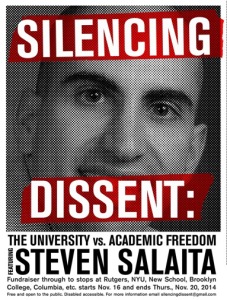
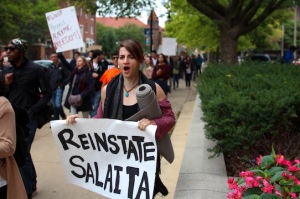
Academic Freedom Case Gains Traction
Since the University of Illinois at Urbana-Champaign Board of Trustees rejected Professor Steven Salaita’s candidacy for a tenured faculty appointment to the American Indian studies program, Salaita has been giving presentations about his case and the importance of academic freedom. Initially we reported here on Law and Disorder that Professor Salaita was un-hired from the American Indian Studies program at the University of Illinois at Urbana-Champaign because of his statements on social media criticizing Israel’s conduct of military operations in Gaza. Emails within the University revealed under Freedom of Information Act Requests show that it was outside pressure from donors that influenced the University of Illinois Chancellor’s decision to dehire Salaita.
Professor Salaita:
- My Dad grew up in Jordan, my Mom in Nicaragua. I grew up in West Virginia.
- I got my undergraduate and Master’s degree from a small regional college in south west Virginia called Radford University and I got my PhD in Native American Studies from the University of Oklahoma.
- My interest in Native American studies developed from a Native American novel course I took in college. It generated a profound interest in the histories of settlement and dispossession in North America which struck me as similar in important ways to the forms of dispossession that Palestinians have suffered in the Middle East.
- I submitted my application in October of 2012. I was offered the job in September of 2013. Signed the contract of October of 2013.
- The contract was countersigned by university officials and it was made formal. At that point it was announced that I had accepted the job.
- The process was nearly 2 years long from submission of the application to the signing of the contract.
- Any search process in the humanities or social sciences starts with a search committee of 4-6 people. They’ll look over a candidate’s cover letter. They’ll examine a candidate’s scholarship and they’ll examine that scholarship in detail.
- Once the search committee has made its selection it has to go to other committees throughout the university. A committee composed of representatives from the college. In my case the college of liberal arts and sciences.
- Because I was coming in with tenure I also had to be vetted by external referees, anywhere from 4 to 6. They basically read all of my scholarship. I had to send them all of my books, all of my scholarly articles, my teaching dossier.
- Given the statements that Israeli leaders have made, “mowing the lawn in Gaza”, “putting the people in Gaza on a diet” and their long standing discourse about demographic threats and a surplus of Palestinians . . . its hard not to think about those statements and debates when Israel carpet bombs an area twice the size of Washington DC land area that’s also home to 1.8 million people – you can’t help but think its a sort of violence informed by something worse than mere military strategy.
- A right-wing website run by (nominally) Tucker Carlson, the bow-tied gentleman formerly of Crossfire. He’s like he came out of a Republican lab. He wears a bow-tie his name is Tucker.
- His website the Daily Caller, ended up publishing a standard right wing hit piece. We’ve seen them all. Salaita, his tweets are horrible, blah, blah, blah, and by the way he’s going to start a job at the University of Illinois.
- Then the local rag in Urbana Champaign, the News Gazette picked up on the Daily Caller story and the controversy gained steam. The next thing I know I’m receiving an unceremonious termination letter from the chancellor.
- She said she didn’t expect trustee approval so there was no need to show up.
- They called me uncivil then it morphed into anti-semitic.
- Uncivil – – It’s a term that’s deeply rooted in colonial violence, that always implies something sinister without ever having to explain its intent or its meaning.
- It’s a wonderful term for shutting down debate. The entire southern hemisphere was colonized based on notions that they were uncivilized.
- The support has been phenomenal. Sixteen departments at the University of Illinois have voted no confidence in the chancellor and the board of trustees.
- I’ve also received support from the Center For Constitutional Rights, the Modern Language Association, a number of trade unions have passed resolutions condemning the university’s decision and demanding my reinstatement.
- The impulse seems to shut down the debate or discussion before it even begins.
- First of all we feel that its a matter of great import to the public interest that the university administration has arbitrarily taken an action that has had negative consequences for the reputation of the university and its ability to function normally.
- As you know the university is undergoing a boycott. It’s normal functions are being disrupted.
- Support Steven Salaita
Guest – Professor Steven Salaita, former associate professor of English at Virginia Tech. He is the author of six books and writes frequently about Arab Americans, Palestine, Indigenous Peoples, and decolonization. His current book project is entitled Images of Arabs and Muslims in the Age of Obama.Steven grew up in Bluefield, Virginia, to a mother from Nicaragua (by way of Palestine) and a father from Madaba, Jordan. Books by Salaita
—-

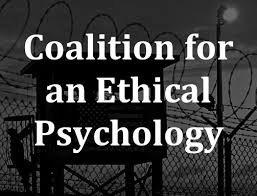
Independent Investigation of APA Ties with Torturers Under Bush Administration
The nation’s largest organization of psychologists is set to conduct an independent review into whether it colluded with or supported the government’s use of torture in the interrogation of prisoners during the Bush administration. In 2011 we reported on health professionals being front and center and complicit in the US policy of torture. The torturers relied heavily on medical opinion. Medical professionals provided sanitizing and rationalization for the infamous torture memos. During water boarding procedures, a doctor would be present. Psychologists were directly involved in the supervision, design and execution of torture at US military and intelligence facilities. This is a violation of state laws and professional ethics. These “health professionals” that were involved with torture still hold their professional licenses to practice.
Dr. Stephen Soldz:
- At this point I think we all know there was a program of torture in the Bush Administration. CIA and the DOD at Guantanamo. Less known was that psychologists were central to it.
- In the CIA, they designed the torture, they were also essential to the legal protection. The Justice Department torture memos basically said that if a health professional, a psychologist or physician is there and says that the interrogation won’t cause severe and long lasting mental harm, than it isn’t torture even if it causes harm.
- In other words, their presence was a get out of jail free card.
- As far as we can see it was central to the Bush Administration’s plans to indemnify themselves while engaging in torture.
- The American Psychological Association apparently worked with the Bush Administration to provide protection for the psychologists who were involved.
- The ethics code had been changed in such a way that it allowed psychologists to disobey the ethics code and follow governmental orders.
- This was actually done before 911 and passed after 911.
- We have been concerned if they (APA) had been complicit in various ways. James Risen from the New York Times just published his new book Pay Any Price and one chapter in there provided direct documentary evidence that APA officials were working with the CIA and the Whitehouse to manipulate the ethics code to apparently allow psychologists to participate.
- Michael Ratner: There was a committee appointed from the APA to look into the APA’s role as I recall . . . Dr Stephen Soldz: . . . to decide on whether psychologists participating in a national security interrogation was ethical – was consistent with the APA’s ethics code.
- They (APA) were not directly involved as far as we know in torture, they were more involved in doing what the CIA and the White House wanted in terms of manipulating ethical understandings.
- We, Amnesty and CCR have called for an independent investigation of the APA for a number of years. We’re glad the APA board has recognized the need.
- They appointed a Chicago attorney who is a specialist in public corruption. We are cautiously optimistic but we have some concerns.
- Its inappropriate for the APA board to appoint its own investigator of whether the APA did something wrong.
- The time frame they gave of 5 months is awfully short for an investigation of this magnitude. We’re hopeful that the investigation will be wide ranging and comprehensive which is what is needed.
- If the accusations in Risen’s book pan out, you have to look at his office (APA CEO) If he knew that means he approved of it. If he didn’t know that means he was incompetent.
- This has been the issue that has divided the APA in the last decade.
- What was most needed by the intelligence community was that it was ethical for the psychologist to participate in the interrogation.
- One of the key people who was in the Bush White House at this time who is implicated is Susan Brandon who is now a top official in Obama’s high value detainee interrogation group.
- If the Republicans win, torture will probably come back.
- Since the Nuremberg trials where Nazi doctors were executed for conducting unethical experiments, informed consent has been the backbone of human subjects research.
- Yet the APA put in this clause – – if laws or institutional regulations (that’s a very broad category institutional regulations) don’t require informed consent and psychologists don’t have to do it.
- If my drug company says I don’t need informed consent . . .there’s no reason why the APA should get rid of informed consent for anything but the most trivial and harmless research.
- They’ve never explained where this comes from and its still in effect.
- Ethicalpsychology.org
Guest – Dr. Stephen Soldz, psychologist, psychoanalyst, and public health researcher in Boston, and was a co-author of PHR’s report Experiments in Torture. He is the Director of the Center for Research, Evaluation, and Program Development at the Boston Graduate School of Psychoanalysis. He was Adjunct Assistant Professor of Psychology (Psychiatry) at Harvard Medical School, and has taught at the University of Massachusetts Boston, Boston College, and Boston University.
———————————————————————————

Please help support Law and Disorder. This radio show is now a sponsored project of Fractured Atlas, a non-profit arts service organization. Contributions for the charitable purposes of Law and Disorder must be made payable to Fractured Atlas only and are tax-deductible to the extent permitted by law. You can donate as little as 5.00 a month.
Afghanistan War, Civil Liberties, Criminalizing Dissent, FBI Intrusion, Gaza, Habeas Corpus, Human Rights, Iraq War, Political Prisoner, Prison Industry, Surveillance, Targeting Muslims, Torture, Truth to Power
Podcast: Play in new window | Download
Updates:
- Michael Ratner: Obama Could Allow “Torture Light” Interpretation of U.N. Treaty on Torture
- Michael Smith Returns From Argentina Book Tour, Describes How U.S Attempts To Destabilize Argentina Economy
——-

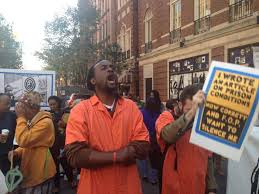
The Revictimization Relief Act (Muzzle Mumia)
Last Thursday, the Pennsylvania State Senate in a bi-partisan 37-11 vote, approved The Revictimization Release Act. This last minute controversial law was ignited by Mumia Abu Jamal’s commencement address delivered at Goddard College in Vermont. The law would grant crime victims or prosecutors acting on their behalf to file a civil action against an offender to seek injunctive relief to stop offenders or former inmates from engaging in conduct that would cause “temporary or permanent state of mental anguish” to the victim.
Mumia Abu Jamal is 60 years old. He’s in the general population at Mahanoy State Correctional Institution in Frackville. He has also given speeches at Evergreen State College in Washington and Antioch College in Ohio.
Attorney Bret Grote:
- The Muzzle Mumia Law as it was called by the Harrisburg Patriot provides a cause of action for a victim of a personal injury crime to sue an offender in state court in Pennsylvania if that offender engages in conduct that “perpetuates” the effect of that crime on the victim. Later on in the statutes, that conduct is defined as including conduct that a temporary or permanent states of mental anguish.
- It also provides for the district attorney where the conviction was secured or the state’s attorney general to essentially act as the private attorney for the victim in order to bring this suit.
- It also does encompass not only speech about the crime whether its somebody like Mumia or Lorenzo Johnson or countless others who speak out about being framed up in Pennsylvania, but it doesn’t even make any exceptions for legal proceedings – and obviously people appealing criminal convictions can cause anguish to others.
- There are standards and no definitions for the conduct that is at issue except in relation to its impact on the victim and to provide some context as I’m sure your listeners know why it was written this way is they needed to write a statute that would sweep so broadly so as to encompass things like Mumia giving a commencement address at Goddard College, which was used as a pretext for whipping up this frenzy at the state legislature.
- It is a prior restraint on the freedom of speech but its written so broadly that Maureen Faulkner or the district attorney could conceivably go into court under this law.
- The House Judiciary committee in discussing this law when it was introduced in committee raised the issue of would this allow a court to enjoin what they called third party vessels.
- It could be Prison Radio, or it could be an individual who is authorized to speak to the media, or make a public statement.
- It was passed 197-0 in the House Legislature, and 37-11 in the Senate.
- It just shows you what takes precedence over any kind of adherence of the Constitution of the state or the United States, more than any law is allegiance to power amongst the political class, Pennsylvania politicians, attorney generals, district attorneys, are no strangers to Constitutional violations, its a normative practice for them.
- Right now, I’m representing Mumia in this and Prison Radio and Robert Holbrook who is a juvenile lifer and Human Rights Coalition member and activist and writer.
- Its unconstitutional under traditional over breadth analysis, it penalized lawful speech and its void for vagueness.
- There is probably nothing that would be more traumatizing for an actual victim of a crime then to have to go through this process that they’ve laid out in the Revictimization Release Act.
- They explicitly and exclusively focused on Mumia.
- This legislation was introduced by a former member of the Fraternal Order of Police, Mike Verib, who was a former Philadelphia police officer now a state legislator. In the context of Mumia’s case they have been leading a lynch mob literally in the streets to snuff out his voice.
- For decades the judge that presided over his trial was a Fraternal Order of Police member. They finance and vet the campaigns of every Supreme Court Justice in the state of Pennsylvania, the same with people running for office as governors.
- Mumia is being used in this context to reestablish the narrative, the Fraternal Order of Police, the police, their political counterparts are righteous protectors of public safety and that they’re beyond question and beyond reproach in trying to reset the propaganda line that has been dislodged in the wake of the rebellions in Ferguson, Illinois.
Guest – Pennsylvania attorney Brete Grote, a member of the Russell Maroon Shoatz legal team and cofounder and legal director of the Abolitionist Law Center. Bret has worked with the Human Rights Coalition since 2007 as an investigator, organizer, and researcher. He was the Isabel and Alger Hiss Racial Justice Fellow at the Center for Constitutional Rights in 2012. He graduated from the University of Pitt Law School in May 2013 and was recognized as the school’s Distinguished Public Interest Scholar.
——-

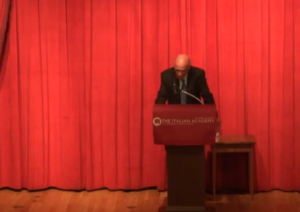
Richard Falk: The Palestinian Future After Gaza
We hear a presentation by Richard Falk titled The Palestinian Future After Gaza. Richard Falk was presenting at the Edward W. Said Memorial Lecture, co-sponsored by Columbia’s Heyman Center for the Humanities. It’s given once a year in honor of the public intellectual and literary critic, Edward W. Said, who taught in the English & Comparative Literature Department at Columbia from 1963 until 2003
Richard Falk is Albert G. Professor of International Law and Practice Emeritus at Princeton where he was a member of the faculty for 40 years. Since 2002 he has been associated with Global & International Studies at University of California, Santa Barbara as a research professor.
He was Special Rapporteur on Occupied Palestine for the UN Human Rights Council since 2008, and served on a panel of experts appointed by the President of the UN General Assembly, 2008-2009. He is Chair of the Board of Directors, Nuclear Age Peace Foundation, an NGO located in Santa Barbara.
He is also a member of the editorial board of several journals and magazines, including the American Journal of International Law, Third World Quarterly, Globalizations, The Nation, and The Progressive. Formerly, he was for many years North American Director of the World Order Models Project.
————————————————————————–
Afghanistan War, CIA Sponsored Terror, Civil Liberties, Criminalizing Dissent, Gaza, Guantanamo, Habeas Corpus, Human Rights, Iraq War, NSA Spying, Political Prisoner, Prison Industry, Surveillance, Targeting Muslims, Torture, Truth to Power, War Resister
Podcast: Play in new window | Download
Updates:
- Mumia Spurs Bill To Block Publicity-Seeking Criminals (Son of Sam Law)
- Guantanamo Bay Prisoner Files Historic Lawsuit Against Obama Over Force-Feeding
——

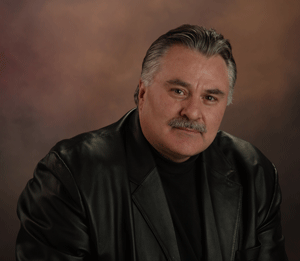
Lawyers You’ll Like – Charlie Abourezk
As part of our Lawyers You’ll Like series, we talk with attorney Charles Abourezk about his work with the Native American community in South Dakota. Charles is a trial attorney, author and film maker. His documentary A Tattoo On My Heart: The Warriors of Wounded Knee 1973 is a gripping documentation of those American Indian men and women involved in the siege. Charles is the Chief Justice of the Rosebud Sioux Tribe Supreme Court, he’s also member of South Dakota Advisory Committee to U.S. Commission on Civil Rights. He’s the son of James George Abourezk, former Democratic United States Representative and United States Senator where he was generally viewed as critical of US foreign policy in Israel and Palestinian.
Attorney Charlie Abourezk:
- The Rosebud Sioux Tribe is the second largest tribe in South Dakota. There are nine total tribal governments in the state. It’s where I grew up.
- I spent most of my adult life on the Pine Ridge Reservation which has been the poorest county in the United States.
- I went to law school, long after I worked for a number of Indian organizations including a Native American NGO that worked at the UN in Category 2 status.
- The Pine Ridge Reservation is the second largest reservation in the United States, located in south western South Dakota. It’s a huge land mass, takes about an hour and a half to drive diagonally across the reservation. There’s very little economy. The geography is very poor, it lends itself to cattle grazing but not much in terms of raising crops.
- Wounded Knee was the site of the 1890 massacre in which almost 300 American Indians from several different tribes were killed by the U.S. Army. They were surrounded and essentially murdered on that spot.
- So, in 1973, there had been a lot of racial discrimination and racially motivated killings of Indian people, the American Indian Movement returned and joined forces with the traditional people who had long been neglected on the reservation.
- As a result they decided to engage in a protest. They chose the site of the massacre at Wounded Knee, to stage that protest.
- They set up sort of a line there, with the government and US Marshalls, along with Dick Wilson’s followers who were armed and were called the goon squad and formed the other side of that line. The siege lasted 71 days.
- It finally dismantled and number of people were prosecuted as a result of that.
- At Wounded Knee, two Indian people killed and one Marshall wounded.
- We set up a recording studio right at the Wounded Knee school, and just took people’s stories. I did the interviews, they were really powerful. There were some stories that didn’t fit with the arc of the film but were incredible. I’m glad I documented it then, because I think of the people in the documentary, 7 or 8 have now passed away.
- I continue to be a strong advocate for tribal sovereignty, self determination and the rights of individuals especially within the dynamic of racial discrimination which at times in South Dakota have been as bad as the south is toward African Americans.
- I helped affirm and preserve the boundaries of the Yankton Sioux Reservation, that went up to the Supreme Court twice. I was the lead council when it finally concluded, we were able to win that one.
- I was a former Supreme Court Justice on the Pine Ridge Reservation for their Supreme Court and I retired from that position.
- Except for limited jurisdiction the Federal Government had on criminal matters, the civil jurisdiction for incidents which occur within the reservation lie with the tribal court as do criminal misdemeanors for tribal members and non tribal members meaning Indians from other tribes that happen to be living on the reservation.
- In the Native American view you can’t really have winners and losers, you have to try to restore the harmony or the balance within the tribe.
- The American government adopted the British style of colonialism as did the Israelis when they began to colonize parts of Palestine. It kind of goes in 4 steps.
- A disruption of traditional agriculture and food gathering, which out here was done in two ways, killing off the buffalo and secondly constraining them from moving around in a wide arc for hunting and gathering – by putting them on the reservation they stopped that.
- Transfer commonly owned land into private ownership, to turn land into a commodity that can be bought and sold. They did that through what’s called the Daws Act or the Allotment Act in the late 1800s.
- Theodore Roosevelt called that act a “might pulverizing machine” with which to break up the tribal mass.
- The third step was to develop a native ruling elite. In this case they first developed “paper chiefs” then in the 1930s developed modern tribal government.
- Last step, develop an educated elite. Of course any colonizer anywhere, that’s the step that always back fires.
- The American Indian Movement was born from the children of the parents who were relocated into cities trained as workers.
- They were the ones who came back home and joined forces with the traditional people and stood up against racism and in favor of tribal sovereignty and tribal self determination.
- You see many parallels with that and what’s happening to the Palestinians in the West Bank and Gaza. Dr William Julius Wilson
Guest – Charlie Abourezk, from Rapid City, South Dakota and is a trial attorney, longtime activist and community organizer in the native American community in South Dakota. He is also a documentary film maker, his most recent is the feature length documentary “A Tattoo On My Heart: The Warriors of Wounded Knee 1973” which played on public television stations around the United States. He is the current Chief Justice of the Rosebud Sioux Tribe’s Supreme Court and a member of the South Dakota Advisory Committee to the US Commission on Civil Rights. His client base is made up largely of Native Americans, tribal schools and Indian tribal governments, but he also represents plaintiffs in civil rights litigation. He will have a book coming out this next year entitled “A Mighty Pulverizing Machine: The Continuing Colonization of American Indians.”
——-
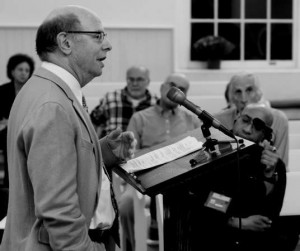
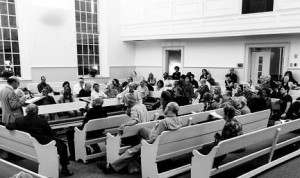
From Guantanamo to Wikileaks: Taking on the State In a Post 9/11 World.
Our own Michael Ratner, President Emeritus, Center for Constitutional Rights (CCR), past president, National Lawyers Guild; Chair, European Center for Constitutional and Human Rights delivered a talk last week titled ‘From Guantanamo to Wikileaks: Taking on the State In a Post 9/11 World.’ Michael was honored with a PathMaker to Peace Award by the Brooklyn For Peace Organization for his consistent work in litigation against government spying and surveillance of activists including the targeting of Muslims particularly after 9/11.
Law and Disorder Co-host Attorney Michael Ratner, President Emeritus of the Center for Constitutional Rights (CCR), a non-profit human rights litigation organization based in New York City and president of the European Center for Constitutional and Human Rights (ECCHR) based in Berlin. Ratner and CCR are currently the attorneys in the United States for publishers Julian Assange and Wikileaks. He was co-counsel in representing the Guantanamo Bay detainees in the United States Supreme Court, where, in June 2004, the court decided his clients have the right to test the legality of their detentions in court. Ratner is also a past president of the National Lawyers Guild and the author of numerous books and articles, including the books Who Killed Che? How the CIA Got Away With Murder, The Trial of Donald Rumsfeld: A Prosecution by Book, Against War with Iraq and Guantanamo: What the World Should Know, as well as a textbook on international human rights.
———————————————————————————-

Please help support Law and Disorder, the show is now a sponsored project of Fractured Atlas, a non-profit arts service organization. Contributions for the charitable purposes of Law and Disorder must be made payable to Fractured Atlas only and are tax-deductible to the extent permitted by law.
CIA Sponsored Terror, Civil Liberties, Criminalizing Dissent, Gaza, Guantanamo, Habeas Corpus, Human Rights, Military Tribunal, NSA Spying, Political Prisoner, Prosecution of the Bush Administration, Supreme Court, Surveillance, Targeting Muslims, Torture, War Resister
Podcast: Play in new window | Download
Updates:
- Michael Ratner: Moazzam Begg Freed After Terrorism Charges Dropped
- Michael Ratner: 149 Inmates In Guantanamo Bay Prison – 79 Approved For Transfer
——-
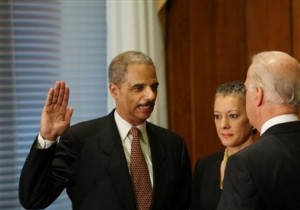

U.S. Attorney General Eric Holder Evaluation
Michael Ratner and Heidi Boghosian draw a balance sheet on the record of U.S. Attorney General Eric Holder.
- Holder approved drone killing of American citizen al-Awlaki without due process.
- Holder failed to prosecute any of the Bush Administration officials who were openly admitted torturers.
- Holder abrogated the responsibility in holding corporate criminals accountable. Wall Street.
- Holder settled with HSBC for 2 billion, the bank was caught laundering money for drug cartels yet no prosecution.
- With-Holder prosecuted whistleblowers, Chelsea Manning, Julian Assange, Edward Snowden, James Risen, Jeremy Hammond, Fox News Reporter,
Law and Disorder Co-host Attorney Heidi Boghosian, executive director of the A.J. Muste Memorial Institute, a nonprofit charitable foundation providing support to the nonviolent movement for social change. Before that she was executive director of the National Lawyers Guild. She is author of the book “Spying on Democracy: Government Surveillance, Corporate Power, and Public Resistance” (City Lights, 2013) as well as several reports on policing and the First Amendment.
Law and Disorder Co-host Attorney Michael Ratner, President Emeritus of the Center for Constitutional Rights (CCR), a non-profit human rights litigation organization based in New York City and president of the European Center for Constitutional and Human Rights (ECCHR) based in Berlin. Ratner and CCR are currently the attorneys in the United States for publishers Julian Assange and Wikileaks. He was co-counsel in representing the Guantanamo Bay detainees in the United States Supreme Court, where, in June 2004, the court decided his clients have the right to test the legality of their detentions in court. Ratner is also a past president of the National Lawyers Guild and the author of numerous books and articles, including the books Who Killed Che? How the CIA Got Away With Murder, The Trial of Donald Rumsfeld: A Prosecution by Book, Against War with Iraq and Guantanamo: What the World Should Know, as well as a textbook on international human rights.
——-
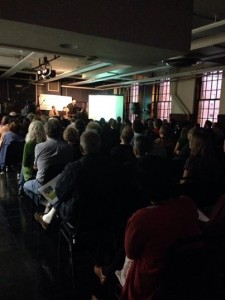

Academic Freedom & Political Dissent: A Conversation with Katherine Franke and the Community
We continue to report on Professor Steven Salaita’s case and the concerns regarding established principles of academic freedom. We hear a presentation by Katherine Franke, Professor of Law at Columbia University. Listeners may recall that Professor Salaita was unhired from the American Indian Studies program at the University of Illinois at Urbana-Champaign because of his statements on social media criticizing Israel’s conduct of military operations in Gaza. We reported last month on Law and Disorder that scholars from law schools around the country came out with a letter condemning the decision of the University of Illinois to unhire Professor Salaita. Katherine Franke discussed Salaita’s case at the University of Illinois at Urbana-Champaign late last month.
Speaker – Katherine Franke, Isidor and Seville Sulzbacher Professor of Law; Director, Center for Gender and Sexuality Law at Columbia University. She was awarded a 2011 Guggenheim Fellowship, and is among the nation’s leading scholars in the area of feminism, sexuality and race. In addition to her scholarly writing on sexual harassment, gender equality, sexual rights, and racial history, she writes regularly for a more popular audience in the Gender and Sexuality Law Blog. Franke is also on the Executive Committee for Columbia’s Institute for Research on Women and Gender, and the Center for Palestine Studies and teaches at a medium security women’s prison in Manhattan. Her legal career began as a civil rights lawyer, first specializing in HIV discrimination cases and then race and sex cases more generally. In the last 25 years she has authored briefs in cases addressing HIV discrimination, forced sterilization, same-sex sexual harassment, gender stereotyping, and transgender discrimination in the Supreme Court and other lower courts.
—————————————————————-

Please help support Law and Disorder, the show is now a sponsored project of Fractured Atlas, a non-profit arts service organization. Contributions for the charitable purposes of Law and Disorder must be made payable to Fractured Atlas only and are tax-deductible to the extent permitted by law.
Civil Liberties, Criminalizing Dissent, Gaza, Human Rights, Iraq War, Political Prisoner, Surveillance, Targeting Muslims, Torture
Podcast: Play in new window | Download

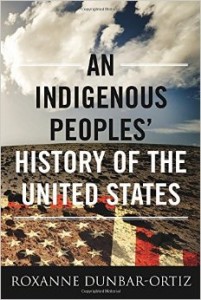
An Indigenous Peoples’ History of the United States
In the United States today, there are more than 500 federally recognized indigenous communities and nations comprising nearly three million people. These are the descendants of the 15 million people who once inhabited this land and are the subject of the latest book by Roxanne Dunbar-Ortiz. In An Indigenous Peoples’ History of the United States, Dunbar-Ortiz challenges the founding myth of the United States and shows how policy against the indigenous peoples was genocidal and imperialist—designed to crush the original inhabitants. Spanning more than 300 years, this classic bottom-up history significantly reframes how we view our past. Told from the viewpoint of the indigenous, it reveals how Native Americans, for centuries, actively resisted expansion of the U.S. empire.
Roxanne Dunbar-Ortiz:
- It’s absolutely necessary to know this history of settler colonialism and how it effects consciousness today of U.S. people and in the world because everyone is convinced of this myth of the United States and somehow its always going off the path of this destiny that has never been true in the first place.
- It’s like a fairy tale except its extremely deadly and dangerous.
- Other countries have romantic myths as their form of nationalism but they don’t control the world with this ideology.
- The myth is that it was a birth of settler democracy but we know from apartheid South Africa, we know from colonialism, particularly settler colonialism such as Israel.
- There are so many parallels with Israel because the Puritans and this became embedded in all settlers, had this idea of the new Jerusalem of Zion. They used that terminology.
- That God had given them this land to settle, it wasn’t just a right it was a responsibility to destiny, to the world.
- This made the native farmer and fisherman, ordinary people like other people in the world into savages and monsters, sort of like the Israelis to do the Palestinians today.
- Throughout the book I have a theme of the militarism and the counterinsurgency that attacks civilians and a food fight they call it, burns the food, supplies, the crops, burns the houses of the people in their towns, creates refugees. This then becomes the pattern.
- Every generation there is this Indian war. Vietnam looked like an Indian war, even the language they use – indian country for enemy territory, all of the weapons they name after native people.
- This is not how we think of the United States, supposedly a civilian country, the military is always under control of civilians but that civilian president is commander and chief of the armed forces.
- There’s also a theory, the Bering Strait the one entrance to the whole continent, which is absurd because all of the people on the coast were great seafaring people.
- A part of European imperialism say as the beginning of everything that it connected people up. Actually what it did was separate people each other and their tradition.
- My specialization is the southwest and central Mexico, Central America. I knew there were complex trade routes and roads all over the place, irrigation canals, how they developed agriculture.
- The first chapter, Follow the Corn, I did just that. I followed out of Mexico, the dispersion of corn agriculture all the way to Tierra Del Fuego to the sub Arctic and coast to coast.
- What you find in the Americas is when they get to the point of abusing the environment and become dictatorial, there tends to be revolts to overthrow, that was happening when Cortez came to Mexico.
- The Quetzalcoatl cult that took over the Aztec government became abusive and was doing slave raiding. Had done a wonderful job of dispersing trade routes. Cortez simply allied with the rebels and overthrew the central government.
- Course they couldn’t know his intentions of simply wiping out their civilization.
- When British colonialism came to North America with these peculiar characteristics of the puritan ideology settling in. With 2 centuries of settler colonialism they developed this idea of ownership.
- It went from owning human beings to the idea of owning the land.
- George Washington was a surveyor and you have to ask why was such a super wealthy – a lowly surveyor?
- Surveyors got to choose the best land, and got to mark it up. They had already developed this idea of a Platte, creating territories that would then become states once they had a majority settler population.
- That’s why it took so long for Oklahoma, Oklahoma was the 47th state, New Mexico, Arizona, these places that had a majority native population.
- It was rough being native in the United States, it still is. I grew up in Canadian county Oklahoma, my dad sharecropped, and was a tenant farmer throughout that area until the depression wiped it out.
- The people went to California as refugees.
- I’m cautious about the identity because native nationalism Cherokee or Onondaga or Shawnee or Creek Muskogee
- There was an instance in 1917, I think its one of the most important moments in US history and hardly anyone knows about it. Jack Womack and I had written about it Monthly Review, it was called the Green Corn Rebellion.
- That is the main demand, land base, nationhood, the ability to prosper and exist as people, not just as individuals being assimilated out, that’s another form of genocide.
Guest – Roxanne Dunbar-Ortiz, grew up in rural Oklahoma, the daughter of a farmer and half-Indian mother. She has been active in the American Indian Movement for more than four decades and is known for her lifelong commitment to national and international social justice issues. After receiving her PhD in history at the University of California at Los Angeles, she taught in the newly established Native American Studies Program at California State University and helped found the departments of Ethnic Studies and Women’s Studies. Her 1977 book The Great Sioux Nation was the fundamental document at the first international conference on Indians in the Americas, held at the United Nations’ headquarters in Geneva. She is the author or editor of seven books.
———
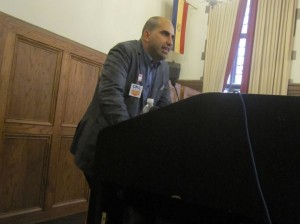
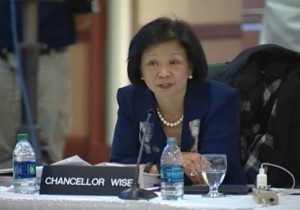
Academic Freedom Case: Professor Steven Salaita
Last Thursday the University of Illinois at Urbana-Champaign Board of Trustees rejected Professor Steven Salaita’s candidacy for a tenured faculty appointment to the American Indian studies program. Initially we reported here on Law and Disorder that Professor Salaita was essentially dehired from the American Indian Studies program at the University of Illinois at Urbana-Champaign because of his statements on social media criticizing Israel’s conduct of military operations in Gaza. Emails within the University revealed under Freedom of Information Act Requests show that it was outside pressure from donors that influenced the University of Illinois Chancellor’s decision to dehire Salaita.
Professor Steven Salaita:
- I received the job offer at the end of September 2013, the first offer was for me to begin on June 2014 but because of my obligations to Virgina Tech and short time for moving we pushed it back to mid August.
- Everything was good to go, we set up movers, my classes were ready to teach they had been assigned to me. I ordered my textbooks, on August 2, I received a letter from the chancellor Phyllis Wise, telling me the termination was going to be withdrawn, so it left me scrambling for what to do, because I already resigned my position at Virginia Tech.
- So all of a sudden I didn’t have a job, at Illinois or Virginia Tech.
- Publicly released documents indicate that donor pressure played a large role in it.
- There’s been some consternation about my tweets about Operation Protective Edge, that’s Israel’s recent invasion of the Gaza Strip and I think that had a lot to do with the donor pressure.
- I think the university is pressing this idea of incivility in social media.
- I think one of the saddest parts of the whole affair is that I hadn’t had the opportunity to join them and become their colleague and work with them (Professors at the American Indian Studies Department) and they’ve been terrific throughout this entire affair.
- Academic hiring happens at the level of faculty, it happens at the level of department and search committees within departments will choose the hire, sometimes the entire department has to sign off on it.
- Then it gets kicked up the dean, then it will get kicked up to the provost or chancellor for their approval, that’s what we call democratic governance on campus.
- It’s kind of an allegory of the position of American Indian nations in the United States and Canada. They’re seen as not being able to make their own autonomous decisions. They’re not allowed to articulate their own practices of sovereignty without the oversight of authorities above them.
- The discourse they used in firing me is remarkable. To describe somebody who has been hired by an American Indian Studies Department as uncivil draws on hundreds of years of colonial discourse that I find shocking.
- It’s an allegory of history and politics that exist in microcosmic form within the framework of the University of Illinois.
- In this case civility means acquiescence to power, and incivility equates to dissent.
- In lots of ways my case has become something of an avatar, a flashpoint for people’s grievances.
- I could really easily be identified with BDS and I think within the past year, 2 things have happened that have caused Zionists to step up their game around this issue. One is the string of boycott resolutions that have been ratified by scholarly organizations by labor unions, by civil rights groups, by churches.
- I think the response to it is not engage on the issues, not to have conversations or debates about the issues but to shut down our side altogether. They don’t want to have debates, they want a silence.
- They don’t want to engage in conversation they want the discussion to be unilateral.
- Support Steven Salaita
Guest – Professor Steven Salaita, former associate professor of English at Virginia Tech. He is the author of six books and writes frequently about Arab Americans, Palestine, Indigenous Peoples, and decolonization. His current book project is entitled Images of Arabs and Muslims in the Age of Obama.Steven grew up in Bluefield, Virginia, to a mother from Nicaragua (by way of Palestine) and a father from Madaba, Jordan. Books by Salaita
—————————————————————————————

Please help support Law and Disorder, the show is now a sponsored project of Fractured Atlas, a non-profit arts service organization. Contributions for the charitable purposes of Law and Disorder must be made payable to Fractured Atlas only and are tax-deductible to the extent permitted by law.
Afghanistan War, Civil Liberties, Climate Change, Criminalizing Dissent, FBI Intrusion, Gaza, Human Rights, Iraq Veterans, Iraq War, Targeting Muslims, Torture, War Resister
Podcast: Play in new window | Download
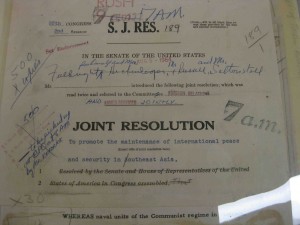
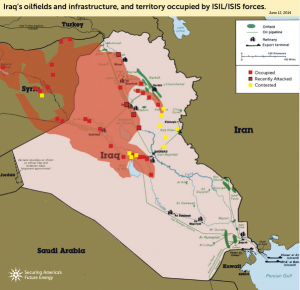
The Legality of War Powers: Michael Ratner
Law and Disorder co-host Michael Ratner explains war powers in the United States and questions the legality of President Barack Obama decision to launch attacks against the Islamic State using the 2001 Authorization To Use Military Force. Michael Ratner and Jules Lobel with the Center for Constitutional Rights have brought a number of cases challenging the decision to go to war including Vietnam, El Salvador and Grenada
Attorney Michael Ratner:
- I’ve spent as a number of us had a lot of our lives trying to restrain U.S. war powers. The U.S. particularly the president or the Congress together going to war around the world.
- It’s been a task that has been singularly unsuccessful, starting with Vietnam where we brought case after case. Only at the very end of the war really did Congress finally act to restrict the president after there were secret wars carried out in Cambodia, in Laos, not just Vietnam.
- Right now the president hasn’t asked for any authority from Congress to either bomb targets in Iraq that he claims are Islamic state targets or presumable if they begun it bombing in Syria, again targets he claims that are Islamic state targets. He’s not asked for any authority.
- He has of course had to use some funding that Congress I think will approve if he asks for more. That is not considered giving authority by Congress, just because they fund a war.
- Coming out of Vietnam, Congress did sort of a mea culpa. They said well, the president dragged us into this war, we passed this Gulf of Tonkin Resolution which was this open ended resolution that said the president could do what ever he wanted in Vietnam. He kept fighting the war based on this broad authorization that Congress gave him over a false incident. . .
- The Gulf of Tonkin Resolution you could liken to the authority Congress gave the president to go to war in Afghanistan called the Authorization to Use Military Force.
- (Still back to Vietnam) So Congress passes what’s called The War Powers Resolution. Congress said to itself, we don’t want to be in the situation like Vietnam again.
- The president, yes is required to go to Congress before he can go to war with any country. The framers were very clear, we don’t want a president making war on his own.
- You get to Vietnam and Congress says we’re going to make a special statute. You still need a declaration of war or a special passage by Congress of a statute authorizing war before you can make war. But in just in case the president goes in to a country without getting a declaration from us or a statute allowing it we’re going to say he can only stay in that country for 60 days.
- After 60 days he’s required to pull out all troops from that country.
- There’s never been any compliance with the War Powers Resolution in the history of our country – where after the 60 day clock, the president has pulled out the troops.
- I’ve litigated that with El Salvador when the U.S. sent in “advisors” into El Salvador, we’ve litigated it in Grenada and other places.
- We litigate these on 3 bases. Non compliance of the War Powers Resolution, Secondly non-compliance with the U.S. Constitution which is the Congress has to declare war not the president, and third non-compliance with the U.N. Charter which says there can be no use of force by any member state, unless its self defense or the UN Security Council approves it.
- The problem here isn’t really a problem of law. The problem here is the problem of having a hegemonic imperialist country that dominates the world through force.
- So that turns us back to where we are right now.
- Obama has two justifications – one is the original grant of authority to bomb and go and use force and U.S. troops in Afghanistan called the Authorization to Use Military Force passed shortly after 911 in 2001 which basically said the president could use force to go after the perpetrators of 911, those who harbored them or those who aided and abetted them.
- In the case of the Islamic State they’re at war with has been denounced by al-Qaeda, so they’re certainly not part of a 911 conspiracy at all.
- There’s no question that he’s illegally bombing the Islamic State in Iraq, illegally bombing them to the extent he is in Syria.
Law and Disorder Co-host Attorney Michael Ratner, President Emeritus of the Center for Constitutional Rights (CCR), a non-profit human rights litigation organization based in New York City and president of the European Center for Constitutional and Human Rights (ECCHR) based in Berlin. Ratner and CCR are currently the attorneys in the United States for publishers Julian Assange and Wikileaks. He was co-counsel in representing the Guantanamo Bay detainees in the United States Supreme Court, where, in June 2004, the court decided his clients have the right to test the legality of their detentions in court. Ratner is also a past president of the National Lawyers Guild and the author of numerous books and articles, including the books Who Killed Che? How the CIA Got Away With Murder, The Trial of Donald Rumsfeld: A Prosecution by Book, Against War with Iraq and Guantanamo: What the World Should Know, as well as a textbook on international human rights.
———
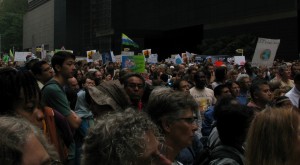
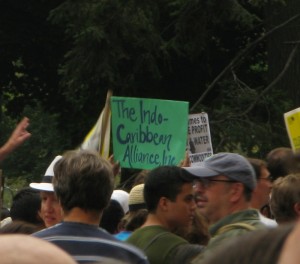
The People’s Climate March and the United Nations Climate Summit
We hear the voices from the climate march held in New York City, a large-scale activist event to advocate global action against climate change. The march winded through the streets of New York Sunday, September 21, 2014. Initially called by 350.org, the environmental organization founded by writer/activist Bill McKibben, the march has been endorsed by nearly 400 organizations, including many international and national unions, churches, schools and community and environmental justice organizations. The action is intended to coincide with the UN Climate Summit this week as U.N. Secretary General Ban Ki-moon invited leaders of government, the private sector and civil society to arrive at a long term solution for climate change.
——–
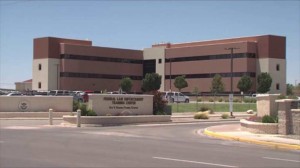
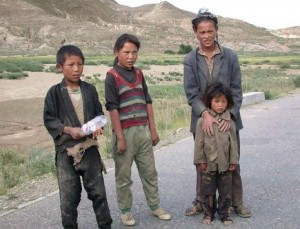
National Immigration Project
Last month the National Immigration Project of the National Lawyers Guild and several other groups sued the federal government to challenge its new and unlawful “fast-track” expedited removal policies that are being used against mothers and children detained in Artesia, New Mexico. Artesia is a remote detention center hundreds of miles from the nearest city. Lawyers with the NIP have collected evidence showing the government disregarding and pushing mothers and children through a deportation process making it nearly impossible for them to consult attorneys, prepare claims for asylum or any defenses to deportation. A class action lawsuit was brought by the Northwest Immigration Rights Project challenging the treatment of unaccompanied children in California with the average of 10 years old.
Paromita Shah:
- Starting in early April the government began to see a surge in arrivals of families – of mothers and children and sometimes children who came by themselves.
- Predominantly these children and families come from countries Honduras, Guatemala and El Salvador.
- They fled their home countries for a variety of reasons, mostly to escape what was horrific atrocities they experienced.
- They went to other countries as well, since other countries have seen a 700 percent increase in asylum claims. Costa Rica and Bolivia.
- The surge is not new. The surge actually began about 5 years ago when people were reporting an exponential increase of children coming across the border and no one knew what to do about it.
- From the stories we’ve heard from many of our members they are fleeing horrific atrocities and came to the United States to seek refuge here.
- The National Immigration Project of the National Lawyers Guild and the ACLU and a number of organizations sued the federal government to challenge its policies that denied a fair deportation process to the families and the children who fled this extreme violence.
- The primary focus of our argument is that these people weren’t given a chance to apply for asylum.
- We are violating our laws that relate to asylum, that relate to the convention against torture. These are laws not only in the United States but also international treaties that we’ve signed onto.
- If you fled a country that abused you and injured you, you would come to the United States border. At that point our laws set up a process called expedited removal. It’s a two stage process.
- The first step includes an interview with asylum officer to evaluate if you have a credible fear. When I say border that’s at any point of entry in the United States.
- Anywhere within 100 miles of the border (U.S.) because that’s how we define the border.
- Two thirds of the population of the United States lives within 100 miles of the border.
- Artesia New Mexico is a federal holding cell for the 672 people who are now detained there.
- If you’re a child that doesn’t have an adult with them you’re supposed to be treated differently under this process. They are not as a practice supposed to be put into expedited removal because of their age. You will have a chance to apply for asylum ( which is incredibly difficult) because you apply without an attorney.
- There are children in New Jersey, Washington state, Texas, L.A., and Florida.
- Children can’t always talk if they were raped or recruited into a gang or brutalized by a gang.
- J.E.F.M. v. Holder
- The irony of this whole process is that Artesia is in New Mexico. The immigration court that’s holding these hearings around Artesia is in Arlington, Virginia.
- They’re conducting these hearings by video.
Guest – Paromita Shah, associate Director of the National Immigration Project. She specializes in immigration detention and enforcement. She is the contributing author and co-presenter of the Deportation 101 curriculum.
———————————————————-

























